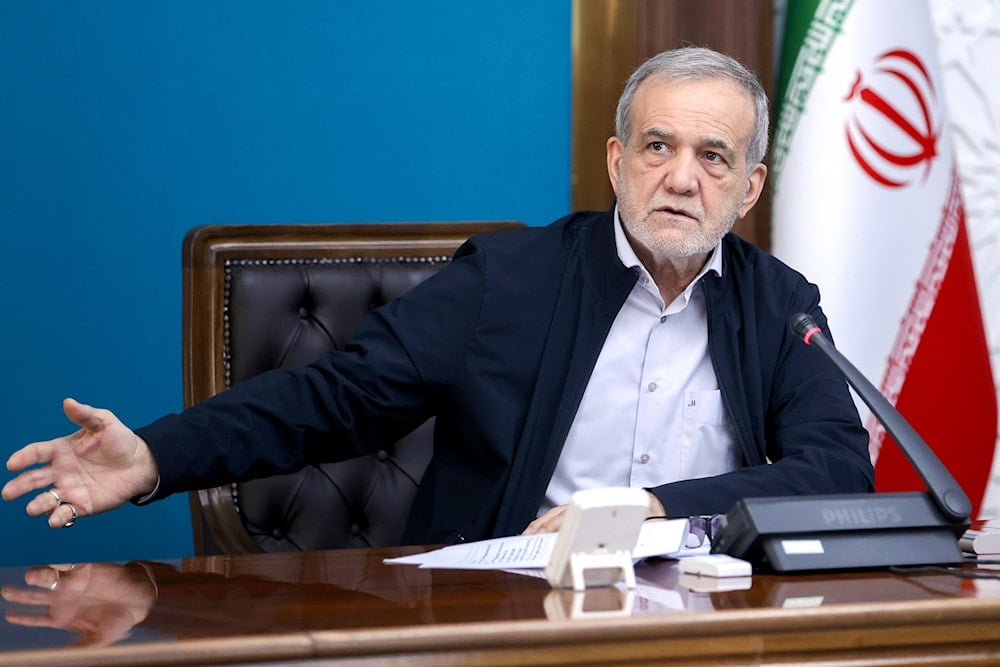Iran neither optimistic nor pessimistic on nuclear talks: Pezeshkian
Echoing remarks made in recent weeks by Sayyed Ali Khamenei, President Pezeshkian said, "We are not pessimistic or optimistic about reaching an agreement."
-

Iranian President Masoud Pezshkian presides over a meeting on blue economy development, April 21, 2025 (Iranian Presidency)
Iranian President Masoud Pezeshkian indicated Monday that Tehran remains open to reviving the 2015 nuclear agreement with the United States, provided the negotiations are conducted fairly and uphold Iran's national dignity and strategic interests.
Speaking at a national event in Tehran, Pezeshkian noted that Iran's foreign policy remains centered on sovereignty, equality, and regional cooperation. "Our government has emphasized from day one that it seeks to strengthen political, economic, scientific, and cultural relations with other countries, especially Islamic and neighboring countries. We also seek constructive interaction with other countries based on mutual respect," he said.
Echoing remarks made in recent weeks by Sayyed Ali Khamenei, Pezeshkian added, "In negotiations with the United States, we are ready to reach an agreement within a certain framework that secures our national interests. But if they do not want to negotiate with us from an equal position, we will continue as before. As the Leader of the Revolution said recently, we are neither optimists nor pessimists."
His comments come amid signs that US President Donald Trump may be reconsidering his administration's hardline stance on Iran. According to a report by The New York Times, Trump's team is preparing for a third round of nuclear talks, scheduled to take place in Oman on April 26. The talks follow two rounds of indirect negotiations in Rome, where both sides reportedly agreed to enter a technical phase focusing on uranium enrichment levels, stockpile limits, and verification protocols.
While Trump's envoy Steve Witkoff has privately urged caution against insisting on the dismantling of Iran's nuclear infrastructure, senior figures in the administration, such as Secretary of State Marco Rubio and National Security Advisor Michael Waltz, have voiced concern over allowing Iran to retain any fuel-producing capabilities. Tehran has firmly rejected demands to deconstruct facilities it has spent billions to build.
Enrichment diplomacy
According to Iranian sources cited by the Times, Tehran may be willing to scale enrichment back to the 3.67% cap outlined in the original JCPOA, while transferring existing stockpiles to third countries such as Russia—a move last used under the 2016 implementation phase of the Obama-era deal.
One proposal under consideration includes a joint uranium enrichment facility with third-party oversight, a compromise that could offer Trump's team a political off-ramp without fully restoring the JCPOA.
Pezeshkian also reaffirmed Iran's internal strength and self-reliance, stating: "Through reliance on our own resources, we can develop the country. We Iranians are competent and skillful people and we never look down on our capabilities," referencing the country's capacity to advance without depending on Western powers.
Foreign Minister Abbas Araghchi, expected to travel to China this week, will continue high-level consultations with key international partners. China remains Iran's largest oil buyer and a central player in nuclear diplomacy.
Read more: Araghchi to visit China ahead of US nuclear talks

 3 Min Read
3 Min Read










